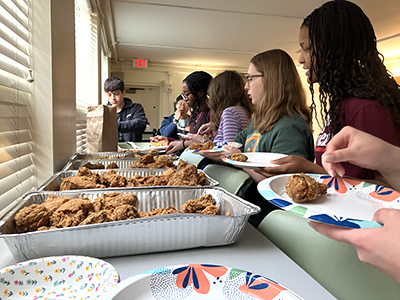A look inside West Fairchild, the International Studies Residential College
“It’s truly a community thing. These are connections I've carried throughout college.””
Sophie Bonfigli
Weinberg senior
Faculty engagement, global culture and tight-knit friendships are at the core of the ISRC experience
Tucked inside the quiet, grey-bricked walls of West Fairchild, the International Studies Residential College (ISRC) offers an inviting space where global curiosity meets close-knit community. Those who call ISRC home quickly discover its unique charm—fueled by community events, deep faculty interactions and an unmatched spirit of camaraderie.
 Erin Waxenbaum, professor of instruction in Anthropology and ISRC faculty chair, has been involved with the Residential College since 2013. She says the Residential College model stands out because it allows students to build meaningful relationships with faculty members who don’t just host events—they live and are actively involved with the building. This proximity fosters everyday interactions, mentorship and a sense of community that extends beyond the classroom.
Erin Waxenbaum, professor of instruction in Anthropology and ISRC faculty chair, has been involved with the Residential College since 2013. She says the Residential College model stands out because it allows students to build meaningful relationships with faculty members who don’t just host events—they live and are actively involved with the building. This proximity fosters everyday interactions, mentorship and a sense of community that extends beyond the classroom.
"I just really liked how it took faculty-student interaction outside the classroom," she said.
According to Waxenbaum, the casual atmosphere breaks down traditional barriers, allowing authentic relationships to flourish beyond typical classroom dynamics. It offers students "insight from faculty once we're separated from that teacher-student grading dynamic."
Indeed, the warmth of ISRC extends beyond academic interactions. Senior biology major and anthropology minor Sophia Bonfigli, who has been closely associated with ISRC throughout her time at Northwestern, emphasizes its profound impact on her college experience. Initially drawn to ISRC due to her international background—her mother emigrated from Poland—Bonfigli immediately felt connected to the community. From exchanging numbers with floormates in her first week to sharing meals and movie nights, the tight-knit group quickly became her social anchor.
“It’s truly a community thing,” Bonfigli said. “These are connections I've carried throughout college.”
Bonfigli met her current roommate and closest friends through ISRC, underscoring the lasting impact of bonds formed in this environment. 
A hallmark of ISRC life is the annual International Dinner, a unique event where students and faculty gather to celebrate cultural diversity through homemade dishes. The entry ticket is a dish prepared by attendees, often representing their personal backgrounds.
“It's really beautiful to share food created by participants,” Waxenbaum said. “Even our faculty fellows bring dishes to share.”
Bonfigli, a four-time event attendee, said she loves this tradition. She has built a reputation for her staple contribution of Polish potato pancakes. The dinner fosters an atmosphere of inclusivity and celebration, making it a favorite event among residents and non-resident members alike.
The community-building doesn't stop at campus borders. ISRC residents regularly enjoy cross-Residential College trips, hosted by Residential Services. During these excursions, students venture into Chicago for activities like Broadway in Chicago shows, sports games at Wrigley Field, museum visits and architectural tours. Waxenbaum champions these experiences as a vital complement to classroom learning, allowing students to explore the vibrant city life just minutes away.
Residents like Bonfigli appreciate the community's intimate size. With roughly 100 students across three floors, it's easy to cultivate meaningful relationships.
"If you put effort in, you'll know every single person on your floor," Bonfigli said.
For students considering where to live on campus, Waxenbaum gives this piece of advice: “ISRC provides a small, close-knit community the moment you step onto campus. It facilitates faculty engagement and offers rich cultural experiences you won’t easily find elsewhere.”
